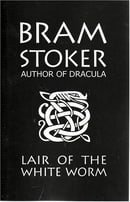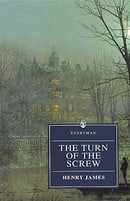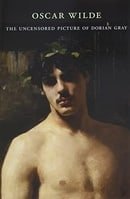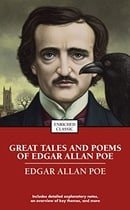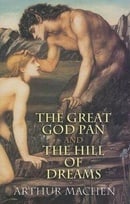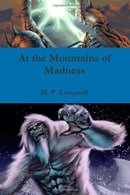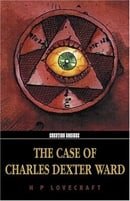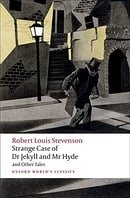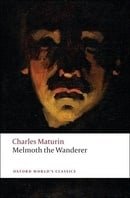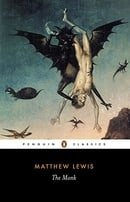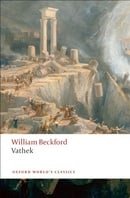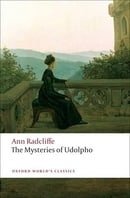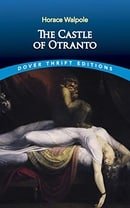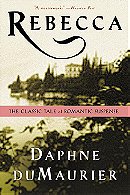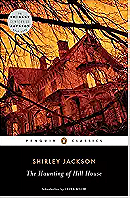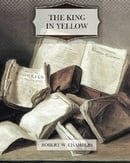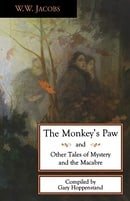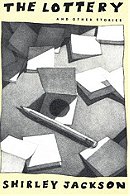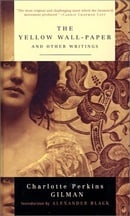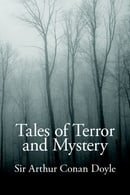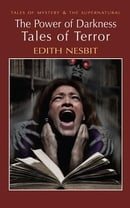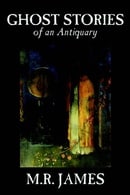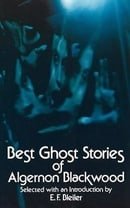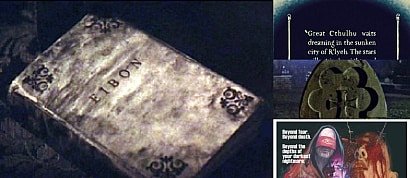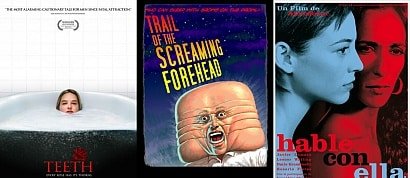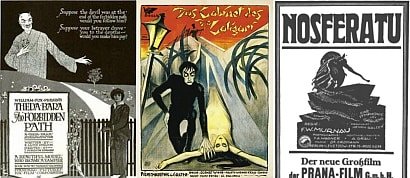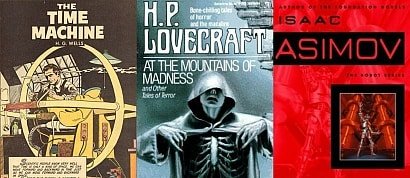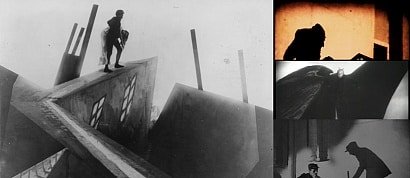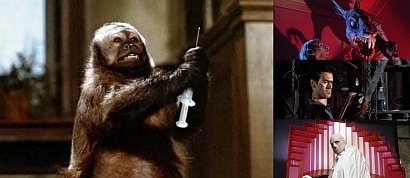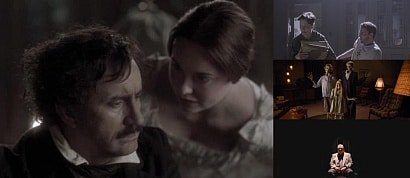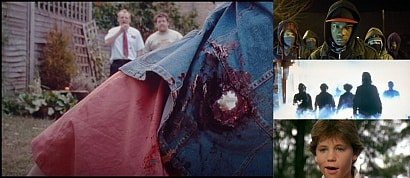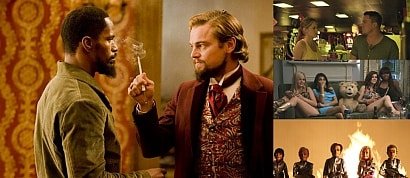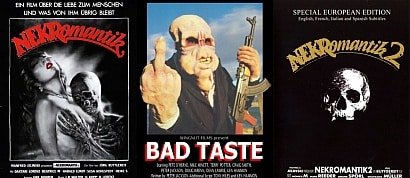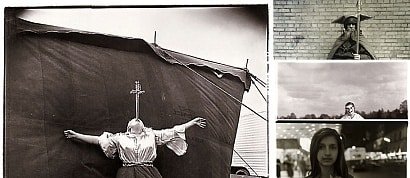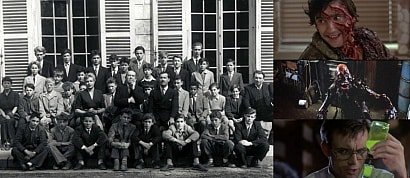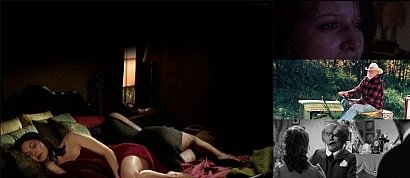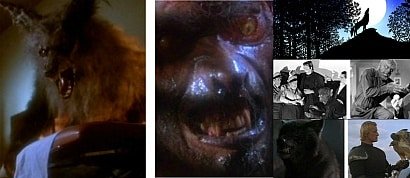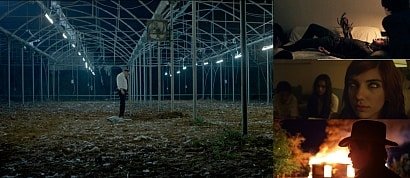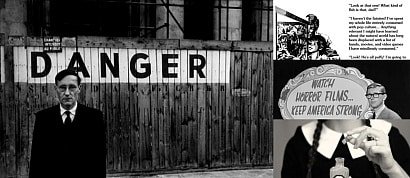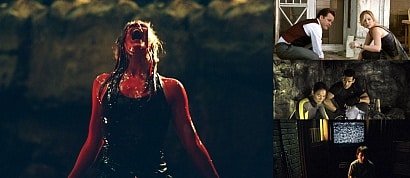Books of Horror - The Classics
Sort by:
Showing 34 items
Rating:
List Type:
 Add items to section
Add items to section
The Essential Novels
Please note that the descriptions are taken from the book publisher for that particular edition of the book or the description found on Amazon.com
Frankenstein: or The Modern Prometheus - Mary Shelley
The epic battle between man and monster reaches its greatest pitch in the famous story of Frankenstein. In trying to create life, the young student Victor Frankenstein unleashes forces beyond his control, setting into motion a long and tragic chain of events that brings Victor himself to the very brink. How he tries to destroy his creation, as it destroys everything Victor loves, is a powerful story of love, friendship …and horror.
Dracula (Oxford World's Classics) - Bram Stoker
Take the papers that are with this, the diaries of Harker and the rest, and read them, and then find the great Un-Dead, and cut off his head and burn his heart or drive a stake through it, so that the world may rest from him. Bram Stoker's classics vampire story has haunted and disturbed the modern imagination for a hundred years. Set in Transylvania, London, and Whitby, it pits the sinister but seductive Count Dracula against a team of Vampire-hunters armed only with typewriters, phonographs, and syringes. They must obstruct his plan to conquer London before the forces of madness and depravity overwhelm them all. Vividly presented in the form of diaries and letters, the narrative blends ancient superstitions with modern technologies, and pulsates with obsessive fears of foreignness and sexuality. Blood, information, and hypnotic energy circulate furiously among the characters until he tale reaches its violent climax. This new edition has an introduction and bibliography which draw on the latest scholarship, and detailed notes which explain literary, geographical, and technological allusions in the novel.
In a tale of ancient evil, Bram Stoker creates a world of lurking horrors and bizarre denizens: a demented mesmerist, hellbent on mentally crushing the girl he loves; a gigantic kite raised to rid the land of an unnatural infestation of birds, and which receives strange commands along its string; and all the while, the great white worm slithers below, seeking its next victim...
The Turn of the Screw (Everyman's Library (Paper))... - Henry James
For lucidity and compactness of style, James's short novels, or novelles, are shining examples of his genius. Few other writings of the century have so captured the American imagination. When "Daisy Miller," the tale of the girl from Schenectady, first appeared in 1878, it was an extraordinary success. James had discovered nothing less than "the American girl"--free spirited, flirtatious, an innocent abroad determined to defy European convention even if it meant scandal . . . or tragedy. But the subtle danger lurking beneath the surface in "Daisy Miller" evolves into a classic tale of terror and obsession in "The Turn Of The Screw." "The imagination, " Henry James said to Bernard Shaw, "has a life if its own." In this blood-curdling story, that imagination weaves the lives of two children, a governess in love with her employer, and a sprawling country house into a flawless story, still unsurpassed as the prototype of modern horror fiction.
A lush, cautionary tale of a life of vileness and deception or a loving portrait of the aesthetic impulse run rampant? Why not both? After Basil Hallward paints a beautiful, young man's portrait, his subject's frivolous wish that the picture change and he remain the same comes true. Dorian Gray's picture grows aged and corrupt while he continues to appear fresh and innocent. After he kills a young woman, "as surely as if I had cut her little throat with a knife", Dorian Gray is surprised to find no difference in his vision or surroundings. "The roses are not less lovely for all that. The birds sing just as happily in my garden."
As Hallward tries to make sense of his creation, his epigram-happy friend Lord Henry Wotton encourages Dorian in his sensual quest with any number of Wildean paradoxes, including the delightful "When we are happy we are always good, but when we are good we are not always happy." But despite its many languorous pleasures, The Picture of Dorian Gray is an imperfect work. Compared to the two (voyeuristic) older men, Dorian is a bore, and his search for ever new sensations far less fun than the novel's drawing-room discussions. Even more oddly, the moral message of the novel contradicts many of Wilde's supposed aims, not least "no artist has ethical sympathies. An ethical sympathy in an artist is an unpardonable mannerism of style." Nonetheless, the glamour boy gets his just deserts. And Wilde, defending Dorian Gray, had it both ways: "All excess, as well as all renunciation, brings its own punishment."
As Hallward tries to make sense of his creation, his epigram-happy friend Lord Henry Wotton encourages Dorian in his sensual quest with any number of Wildean paradoxes, including the delightful "When we are happy we are always good, but when we are good we are not always happy." But despite its many languorous pleasures, The Picture of Dorian Gray is an imperfect work. Compared to the two (voyeuristic) older men, Dorian is a bore, and his search for ever new sensations far less fun than the novel's drawing-room discussions. Even more oddly, the moral message of the novel contradicts many of Wilde's supposed aims, not least "no artist has ethical sympathies. An ethical sympathy in an artist is an unpardonable mannerism of style." Nonetheless, the glamour boy gets his just deserts. And Wilde, defending Dorian Gray, had it both ways: "All excess, as well as all renunciation, brings its own punishment."
Great Tales and Poems of Edgar Allan Poe (Enriched Classics)... - Edgar Allan Poe
Note: Of course there are many diffrent collections of Edgar Allan Poe's works. So, check the table of contents before you buy a copy. I like this version because it has some of the classics as well as my all time favorite "The Gold-Bug".
The Great God Pan and the Hill of Dreams - Arthur Machen
Two works — one of imaginative and decadent horror, the other lyrical and introspective — comprise these books by one of the pioneers of supernatural fiction. The Great God Pan scandalized Victorian London with its suggestive visions of sexuality and paganism. The Hill of Dreams is a semi-autobiographical work about Machen's battles with his inner demons.
At the Mountains of Madness - H. P. Lovecraft
At the Mountains of Madness is a brilliantly told horror novel. Best of all, it's a "perfect" Lovecraft story, combining everything that makes Lovecraft ... well, 'Lovecraftian:' constant impending dread, mysteries beyond time and space, characters driven to the brink of -- and then beyond -- insanity, and science knocking at the doors of the nightmarish unknown
The Case of Charles Dexter Ward - H. P. Lovecraft
A nameless terror surges through centuries to engulf the soul of Charles Dexter Ward, a brilliant New England antiquarian. Evil spirits, malefic gods whose memory lives on in whispered legends and fear-stricken superstitions, still lurk in vile catacombs beneath the surface of a blighted land. Ward is driven to unleash these loathsome horrors upon a defenceless world, possessed by the demonic shade of his ancestor Joseph Curwen, a warlock steeped in the blackest arts of magic. Now Ward too must master these obscene rituals, and pay the price in blood. Human blood. The Case Of Charles Dexter Ward remains the only full-length work of fiction by HP Lovecraft, the master of 20th century horror.
Robert Louis Stevenson's short novel, Dr. Jekyll and Mr. Hyde, first published in 1886, became an instant classic, a Gothic horror originating in a feverish nightmare whose hallucinatory setting in the back streets of London gripped a nation mesmerized by crime and violence. Its revelatory ending is one of the most original and thrilling in English Literature. This new edition of Stevenson's most famous work includes three additional short stories, two short essays, and extracts from contemporary writing on psychological disorders. The introduction considers the reasons for the book's popularity, "the double," and psychoanalytic interpretations, as well as crime, sex, class, and urbanism in the 1880s. Appendixes provide contextual historical material by Henry Maudsley, Frederic Myers, and W.T. Stead. This edition also provides an up-to-date bibliography and full notes, including details of the initial responses of Stevenson's contemporaries, such as John Addington Symonds, Gerard Manley Hopkins and Rider Haggard.
Written by an eccentric Anglican curate in Dublin, Melmoth Wanderer brought the terrors of the Gothic novel to a new pitch of claustrophobic intensity. Its tormented villain, a Faustian transgressor desperately seeking a victim to release him from his fatal bargain with the devil, regarded by Balzac as one of the great outcasts of modern literature.
The Monk - Matthew Gregory Lewis
Savaged by critics for its supposed profanity and obscenity, and bought in large numbers by readers eager to see whether it lived up to its lurid reputation, The Monk became a succès de scandale when it was published in 1796 – not least because its author was a member of parliament and only twenty years old. It recounts the diabolical decline of Ambrosio, a Capuchin superior, who succumbs first to temptations offered by a young girl who has entered his monastery disguised as a boy, and continues his descent with increasingly depraved acts of sorcery, murder, incest and torture. Combining sensationalism with acute psychological insight, this masterpiece of Gothic fiction is a powerful exploration of how violent and erotic impulses can break through the barriers of social and moral restraint.
Vathek (Oxford World's Classics) - William Beckford
Vathek (1786), originally written in French, remains one of the strangest eighteenth-century novels and one of the most difficult to classify. Perverse and grotesque comedy alternates with scenes of 'oriental' magnificence and evocative beauty in the story of the ruthless Caliph Vathek's journey to superb damnation among the subterranean treasures of Eblis. Underlying the elegant prose is a strong element of self-indulgent personal fantasy on the part of Beckford, youthful millionaire, dreamer, and eventually social outcast. Byron, Poe, Mallarmé, and Swinburne are some of the literary figures who have admired Vathek's imaginative power. The text follows that of the 'Third Edition' of 1816, in which Beckford extensively revised and corrected Samuel Henley's original English translations from the French. The elaborate notes retained by Beckford in 1816 are also included.
The Mysteries of Udolpho (Oxford World's Classics)... - Ann Radcliffe
A best-seller in its day and a potent influence on Sade, Poe, and other purveyors of eighteenth and nineteenth-century Gothic horror, The Mysteries of Udolpho remains one of the most important works in the history of European fiction. After Emily St. Aubuert is imprisoned by her evil guardian, Count Montoni, in his gloomy medieval fortress in the Appenines, terror becomes the order of the day. With its dream-like plot and hallucinatory rendering of its characters' psychological states, The Mysteries of Udolpho is a fascinating challenge to contemporary readers.
One of the first, great Gothic novels, and one of the most influential books in literary history, this thrilling tale abounds in adventure, suspense, and supernatural occurrences. In a realm where a villain reigns, mysterious events aid in fulfilling a prophecy that spells doom for the ruler and justice for the rightful heir.
Rebecca - Daphne Du Maurier
With these words, the reader is ushered into an isolated gray stone mansion on the windswept Cornish coast, as the second Mrs. Maxim de Winter recalls the chilling events that transpired as she began her new life as the young bride of a husband she barely knew. For in every corner of every room were phantoms of a time dead but not forgotten—a past devotedly preserved by the sinister housekeeper, Mrs. Danvers: a suite immaculate and untouched, clothing laid out and ready to be worn, but not by any of the great house's current occupants. With an eerie presentiment of evil tightening her heart, the second Mrs. de Winter walked in the shadow of her mysterious predecessor, determined to uncover the darkest secrets and shattering truths about Maxim's first wife—the late and hauntingly beautiful Rebecca.
The Haunting of Hill House (Penguin Classics)... - Shirley Jackson
First published in 1959, Shirley Jackson's The Haunting of Hill House has been hailed as a perfect work of unnerving terror. It is the story of four seekers who arrive at a notoriously unfriendly pile called Hill House: Dr. Montague, an occult scholar looking for solid evidence of a "haunting"; Theodora, his lighthearted assistant; Eleanor, a friendless, fragile young woman well acquainted with poltergeists; and Luke, the future heir of Hill House. At first, their stay seems destined to be merely a spooky encounter with inexplicable phenomena. But Hill House is gathering its powers-and soon it will choose one of them to make its own.
 Add items to section
Add items to section
More... Arthur Machen
While "The Great God Pan" is considered his best work. "The White People" is the story that I found the most frightening. Yes, there is some over lapping of short stories in this section. Sorry about that but feel free to blame the publishers.
 Add items to section
Add items to section
More... H.P. Lovecraft
"The Tomb and Other Tales" is the first book I read and then I started to read his other books. Again, there is an overlapping of short stories in some of these collections.
 Add items to section
Add items to section
A few more short story collections
A List of Classic Horror Novels
& Short Story Collections
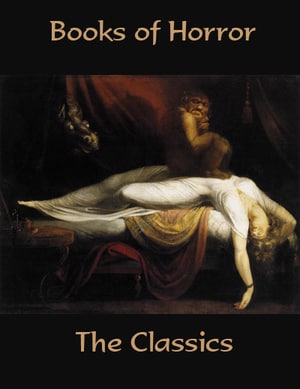
A simple list of classic horror novels and collections of short stories. This list also includes novels considered purely gothic in nature or other works that influenced the horror genre.
Also See:
Books of Horror - Contemporary
by Jaytoast
Classic Halloween Literature
by Pumpkinate
My Cthulhu Mythos Collection
by Fortunato
Added to
11 votes
Favorite Lists: triple the awesomeness
(43 lists)list by Orlok
Published 12 years, 7 months ago  2 comments
2 comments
 2 comments
2 commentsPeople who voted for this also voted for
H.P. Lovecraft On Film
10 Bizarre Films - You May or May Not Want To See
Inspiration: Finding Unheard of Films
20 Sci-Fi Novels that Will Change Your Life
Rediscovering Horror: a new project
the giraffe's best of and favorites lists (movies)
30 day Horror challenge
Masters of Horror - Best to Worst
October 2012 Horrorfest
SML96's Movie Diary - May 2013
True Gore MONSTERpieces
Amazing photos by Diane Arbus
Amazing Horror Films (Updated)
RANKED: The Films of David Lynch
My Top 20 Halloween Favorites: Werewolves
More lists from jaytoast
Cinema Diary - Vol 4 E5 - July 2013
Stanley Film Fest 2013 - Wish I was there...
Dear TV Diary
Cinema Diary - Vol 4 E6 - The Gap
History of My Profile
My Assorted Lists
A Year of Horror - 2005 - Update V.2
 Login
Login
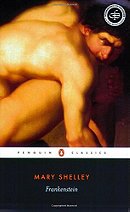
 143
143
 8.1
8.1
 0
0

